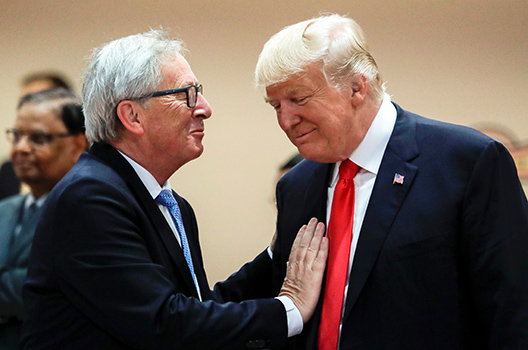 European Commission President Jean-Claude Juncker will meet with US President Donald J. Trump at the White House on July 25 in an attempt to calm fears of a trade war between Europe and the United States.
European Commission President Jean-Claude Juncker will meet with US President Donald J. Trump at the White House on July 25 in an attempt to calm fears of a trade war between Europe and the United States.
Juncker will arrive in Washington amidst considerable tension between the United States and the European Union (EU), which has been building since Trump’s March decision to impose steel and aluminum tariffs on imports. Although the Europeans had hoped to be excluded from these tariffs, Trump announced on May 31 that this would not be the case. The EU responded with countermeasures on US products.
While Juncker will certainly try to achieve an agreement to roll back these measures, attention will instead likely focus on automobile tariffs. On June 22, Trump threatened to impose new tariffs on European automobiles, justified, he argued, by unfairly high European tariffs on US-produced cars. The EU currently places a 9.8 percent import tax on US cars, while the United States only levies a 2.5 percent tax on European cars.
According to reports, Trump administration officials hope that Juncker, who will also be accompanied by the EU’s Commissioner for Trade, Cecilia Malmström, will come to the White House with specific concessions to avoid new US tariffs. A Commission spokesperson downplayed this expectation on July 23, saying that the meeting will be a “discussion” without specific proposals. Trump doubled down on his expectation that trade partners will come to him with new trade offers in two tweets on July 24, saying, “either a country which has treated the United states unfairly on trade negotiates a fair deal, or it gets hit with tariffs.”
There has been some speculation that there could be a compromise involving US tariffs on European-made trucks. Currently, the United States has a 25 percent tariff on European-made trucks (versus a smaller 10% EU tariff on US-made trucks), which could be decreased or lifted in return for European concessions on its automobile tariffs.
It remains to be seen, however, how much power the US president will have to follow through on his current tariff threats. The president has broad authority to implement new tariffs on national security grounds, but could face significant opposition from US car manufacturers, who remain powerful political forces in many of the states Trump won in 2016.
Sens. Doug Jones (D-AL) and Lamar Alexander (R-AL) have announced their intention to introduce legislation to at least temporarily block any new tariffs on European cars, arguing that European countermeasures would hurt car factories located in their states. Trump has faced significant criticism for his steel and aluminum tariffs, which caused US motorcycle manufacturer Harley-Davidson to announce in June that it will be shifting some production overseas to avoid European countermeasures.
Trump’s meeting with Juncker will come at a time of significant tension in US-European relations, especially between Washington and the EU. Trump referred to the EU as a “foe” of the United States, due to the bloc’s stringent trade policy, putting Brussels in the same category as China and Russia. These comments, made during a July 15 interview, came just days after a dramatic NATO summit during which the president argued Germany was a “captive” of Russia and reportedly threatened to seriously downgrade US involvement in NATO.
The EU has also drawn Washington’s ire over its targeting of US tech companies. On July 18, the EU’s Commissioner for Competition, Margrethe Vestager, announced a $5 billion fine for Google, arguing that the company had broken Europe’s antitrust regulations by favoring its search services on its Android mobile operating system.
This latest action follows a previous EU fine on Google of more than $2.8 billion in 2017 and a 2016 decision that Apple had inappropriately received $15 billion in tax breaks from the Republic of Ireland. Trump criticized the most recent EU fine as further proof that the EU has long “taken advantage of the United States.”
The July 25 meeting will also come at an important political time for Juncker, who is in his final year as European Commission president before new European elections are held in May 2019. Juncker made headlines during the July 12 NATO summit as video cameras caught him barely able to stand or walk on his own, as leaders gathered for a group photo at the end of their meetings. EU officials blamed the episode on a “painful attack of sciatica,” furiously denying rumors that he was drunk. One member of the European Parliament has already called for Juncker to resign over the incident, and questions over Juncker’s health will put more spotlight on his performance with Trump on July 25.
Markets, manufacturers, and consumers will be watching Juncker’s visit closely for signals that this recent US-EU trade spat is just a momentary blip. Trump worked hard this month to paint his meetings with NATO leaders, British Prime Minister Theresa May, and Russian President Vladimir Putin as successes, but it remains to be seen what “victory” for his relations with the EU means to him.
David A. Wemer is assistant director, editorial at the Atlantic Council. You can follow him on Twitter @DavidAWemer.
Image: U.S. President Donald Trump, right, talks with European Commission President Jean-Claude Juncker, left, prior to a working session at the G-20 summit in Hamburg, Germany, July 8, 2017. (REUTERS/Markus Schreiber, Pool)
